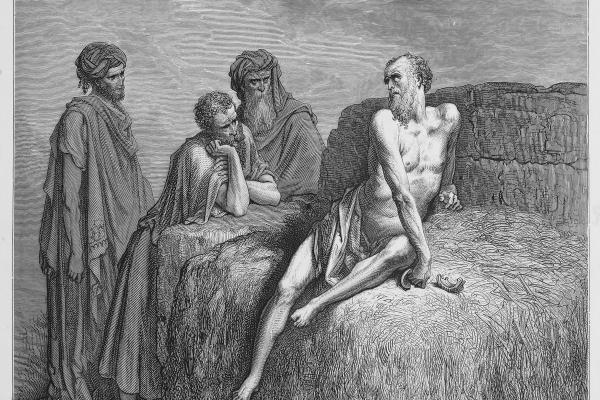The world of Christian theology has seen its fair share of writings that address horrible suffering and the confusion about God’s character that it causes. The question has been on my mind in light of the Philippines’ calamity. Although satisfying answers are difficult to come by with a topic like this, I offer a few insights that have helped me to continue to trust God’s love. The biblical character of Job shows us how, as believers in a loving God, we should regard and respond to suffering around us.
It no longer surprises me when I hear people express cynicism and doubt about a caring God — I sometimes wonder why more Christians have not done so. Whose faith can remain undisturbed when Typhoon Haiyan kills nearly 5,000 Filipinos and inflicts misery on thousands more? I recall a photo of a woman weeping by her child’s body inside a damaged church. Who can imagine her despair? Can we conceive of the hell endured in the same region by enslaved women and girls who are raped and degraded every day, every hour?
I also recall some of my personal encounters. Last spring, I prayed with a woman in a Mexican border city who had been forced by cartel members to watch an execution. “We want you to see a grown man scream before he dies,” they told her as they cut their hostage into pieces. I have seen the skull collection at Rwanda’s genocide memorial and spoken to victims — a machete-scarred man whose family burned to death, and an elderly woman who, after losing her entire family, helped deliver another woman’s baby while lying in a ditch full of bodies.
I think of the tragedies that do not make headlines, like the cerebral palsy of my friends’ son and the neurological disorder that has killed several of my father’s cousins.
Who could possibly affirm God’s love or competence to the mother of that dead child in the Philippines? What sense is there in praying for our daily needs if God so clearly ignores the needs of desperate people all over the world?
I received a bit of clarity and hope in these matters when I recently read an old Gustavo Gutierrez book, On Job. Gutierrez reminds us that Job, in his suffering, fiercely defends his innocence and laments the poverty and oppression that afflict his society. Job accuses God of corruption, violence, and apathy, but in other moments he expresses hope in a just God who listens to people like him and ultimately vindicates them. As the story progresses, it seems that the emotionally tortured Job cannot decide whether God is a bully who lets poor widows wander in the cold or if he is a loving and caring redeemer.
In the final chapter of Job, God declares that Job has spoken of him “what is right,” but he expresses displeasure with Job’s companions who have insisted up until now that sinful actions are to blame for individuals’ misfortunes. Therefore, when confronted with the groans of Syria’s refugees or Romania’s orphans, Gutierrez argues that we should look to Job, not his friends, as a model for how to speak of God, address God, and live our lives. First, we recognize that suffering is not something God brings about according to a moral merits/demerits system to which he is eternally bound. His actions cannot be predicted according to any such framework, says Gutierrez, for God is free and loves the righteous and the unrighteous with “gratuitousness” (the author’s word), as Jesus reminds us in Matthew 5— the same Jesus who gave his life in order to reconcile enemies. Good behavior has never been the basis for the good gifts we receive in life, and we cannot reverse the concept to make guesses about why people are suffering, either.
Gutierrez also concludes that we must find God within the paradox that Job encounters. Job wrestles with two opposed pictures of God that he has encountered in his life, but this is not teaching us to believe in two gods. Rather, following Job’s example, we resolve to trust the God of compassion and reject the picture of the God that would make us indifferent to suffering or resign us to a theology in which suffering is a necessity. We identify with the hurting and use our own lives to heal those whose lives are hell. This does not magically eliminate our doubt or make the world’s pain less awful, but we remember that it is not wrong to express our disillusionment or our grief when we encounter chaos. Job certainly did so in stunning fashion, and God affirmed him.
In the life of Jesus we see Job’s hopes about God fulfilled. As Tim Gombis has written, God through Jesus does not merely sympathize with the Jobs of the world who feel God-forsaken; rather, he himself becomes God-forsaken:
“Jesus entered our enslaved situation, took on humanity, became a servant, went to the lowest place, was treated as a common criminal, was despised and rejected [...] His family misunderstood him, his friends deserted him. He cried out, ‘my God, my God, why have you forsaken me?’ God knows what it’s like to be rejected by God — to feel that you’re completely off God’s radar; that he’s far off, that you’ve been abandoned [...] Jesus is therevelation of God in that God is revealed as the God who is God-forsaken. God says that the way of the cross is the way of God. Just as God is revealed in the corpse hanging on a Roman cross; God is revealed in the God-forsakenness of Jesus […] The cross, therefore, the God-forsaken path, is an essential part of what it means for God to be God.”
Danny Mortensen is resource center assistant at Sojourners.
Photo: Nicku/Shutterstock
Got something to say about what you're reading? We value your feedback!
